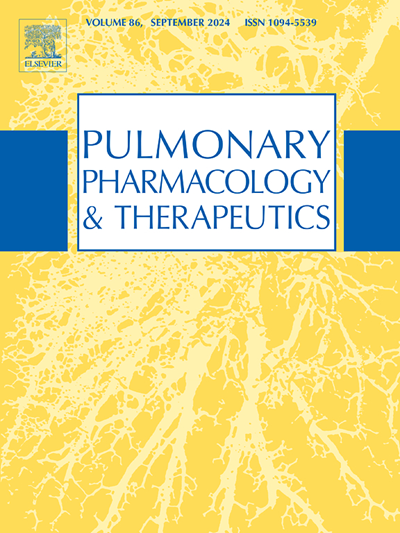ALDH2 attenuates radiation-induced lung injury by inhibiting ROS and epithelial-mesenchymal transition mediated by the TGF-β1/Smad pathway
IF 2.8
3区 医学
Q2 PHARMACOLOGY & PHARMACY
引用次数: 0
Abstract
Radiation-induced lung injury is a significant complication of thoracic malignant tumor radiotherapy, yet effective treatments remain scarce. Aldehyde dehydrogenase 2 (ALDH2) possesses antioxidant and anti-inflammatory properties, but its specific role in radiation-induced lung injury is not well understood. This study aimed to investigate the impact of ALDH2 on radiation-induced lung injury and elucidate the underlying mechanisms. Through analysis of radiation-induced lung injury datasets, intervention with ALDH2 agonists and inhibitors in an in vivo radiation-induced lung injury model, and establishment of an in vitro radiation-induced lung injury model using A549 stable cells with varying ALDH2 expressions, we discovered that ALDH2 expression is reduced in radiation-induced lung injury. Enrichment analysis suggested that ALDH2 may mitigate radiation-induced lung injury by modulating oxidative stress and inflammation levels. Additionally, single-cell data analysis reveals that ALDH2 is primarily localized in myeloid macrophages within the lungs, with its expression also being reduced in lung cancer patients. Subsequent examination of mouse pathological sections, reactive oxygen species (ROS), and inflammatory factor levels confirmed that ALDH2 can lessen radiation-induced lung injury by suppressing ROS and inflammatory factors. Both in vivo and in vitro Western blot analysis further validated that ALDH2 can attenuate epithelial-mesenchymal transition and inhibit the TGF-β1/Smad pathway. Therefore, ALDH2 shows promise in reducing radiation-induced lung injury by inhibiting ROS and TGF-mediated epithelial-mesenchymal transition, making it a potential target for the treatment of radiation-induced lung injury.
ALDH2通过抑制ROS和TGF-β1/Smad通路介导的上皮-间质转化,减轻辐射诱导的肺损伤。
放射性肺损伤是胸部恶性肿瘤放射治疗的重要并发症,但有效的治疗方法仍然很少。醛脱氢酶2 (ALDH2)具有抗氧化和抗炎作用,但其在辐射性肺损伤中的具体作用尚不清楚。本研究旨在探讨ALDH2对辐射性肺损伤的影响并阐明其机制。通过对辐射肺损伤数据集的分析,对体内辐射肺损伤模型进行ALDH2激动剂和抑制剂的干预,以及使用不同ALDH2表达的A549稳定细胞建立体外辐射肺损伤模型,我们发现ALDH2在辐射肺损伤中表达降低。富集分析表明,ALDH2可能通过调节氧化应激和炎症水平来减轻辐射引起的肺损伤。此外,单细胞数据分析显示ALDH2主要定位于肺内的髓系巨噬细胞,其在肺癌患者中的表达也有所降低。随后对小鼠病理切片、活性氧(ROS)和炎症因子水平的检测证实,ALDH2可以通过抑制ROS和炎症因子来减轻辐射引起的肺损伤。体内和体外Western blot分析进一步验证了ALDH2可以减弱上皮-间质转化,抑制TGF-β1/Smad通路。因此,ALDH2有望通过抑制ROS和tgf介导的上皮-间质转化来减轻辐射诱导的肺损伤,使其成为治疗辐射诱导肺损伤的潜在靶点。
本文章由计算机程序翻译,如有差异,请以英文原文为准。
求助全文
约1分钟内获得全文
求助全文
来源期刊
CiteScore
6.20
自引率
0.00%
发文量
41
审稿时长
42 days
期刊介绍:
Pulmonary Pharmacology and Therapeutics (formerly Pulmonary Pharmacology) is concerned with lung pharmacology from molecular to clinical aspects. The subject matter encompasses the major diseases of the lung including asthma, cystic fibrosis, pulmonary circulation, ARDS, carcinoma, bronchitis, emphysema and drug delivery. Laboratory and clinical research on man and animals will be considered including studies related to chemotherapy of cancer, tuberculosis and infection. In addition to original research papers the journal will include review articles and book reviews.
Research Areas Include:
• All major diseases of the lung
• Physiology
• Pathology
• Drug delivery
• Metabolism
• Pulmonary Toxicology.

 求助内容:
求助内容: 应助结果提醒方式:
应助结果提醒方式:


